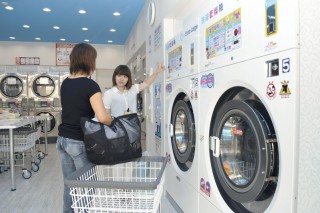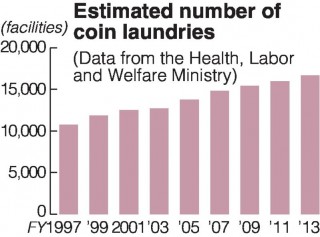Search
▼ Coin laundries becoming more popular with women
- Category:Other

JAPAN NEWS
By Takashi Nishiuchi / Yomiuri Shimbun Staff Writer
Coin laundries are changing. No longer just the domain of male students living alone, the number of coin laundries is increasing yearly as they attract mothers raising children and working women.
However, some people still experience problems when using the machines.
A 36-year-old housewife with a family of five in Chiba began using a nearby laundromat this June. To keep up with three children in primary school and kindergarten, she had been doing the laundry twice daily at home.
But even on rainy days when she used a dryer it could take several hours to dry the clothes.
After hearing from another housewife that dryers at the coin laundry were more convenient, she decided to give them a try.
Clothes dry in just 30 minutes with the large, high-performance machines. “I’m recommending this to my friends facing the same problem,” she said.
The housewife uses the Soga branch of Laundry Senka that opened in March. Staff at the attached dry cleaners keep the laundromat clean and offer advice on which size washer and dryer to use.
“It’s easier to visit with the staff on hand. Almost all of our customers are women,” according to Kazuhiko Motoyama, an official at the business planning department of the laundromat operator Ugo Inc. in Ibaraki Prefecture.
The company has eight other combined dry cleaners-coin laundries throughout the Kanto area.
According to the Health, Labor and Welfare Ministry, the number of coin laundries is rising annually, with 16,693 across the country in fiscal 2013.
Until the 1990s, coin laundries were mainly located in public bathhouses and on shopping streets in urban areas, and patronized mainly by male students and company workers living alone.
Now, shops equipped with large washing machines and dryers with a 20- to 30-kilogram capacity are spreading in the suburbs, and housewives busy with childcare or part-time work or women in double-income households have become prominent users.
A survey last year by the appliance manufacturer Haier Asia Co. showed that 40 percent of people who had used coin laundries were women, and nearly 40 percent of those women were full-time housewives.
A Haier Asia official said, “In addition to reducing the time necessary for washing and drying, coin laundries are also popular for making it possible to clean big items like blankets and futon inexpensively.”
Some working women who do their laundry at night use coin laundries out of concern that the noise of their washing machines would bother their neighbors. A dislike of the smell of drying clothes inside the house is also leading to increased use.
Hot Club is a women-only membership laundry that has three locations in Kobe. Staff is always on hand, and there is a rest area and space for children to play.
The annual membership fee is ¥500. Some users get to know each other and even share meals while waiting for their laundry.
The company operating Hot Club said: “In the past, people used to gather beside a well to do their laundry. The same kind of conversation naturally takes place at our stores.”
Daiji Matsumoto, director of the consulting company Akinai Souzou Kenkyujyo Co. in Tokyo, said, “From now on, we may see a rise in the number of laundromats offering the added value of interaction, in addition to functionality and affordability.”
However, problems at laundromats persist. Consumer affairs centers have received between 120 and 150 complaints per year since fiscal 2010.
In addition to complaints about washers and dryers not working after inserting money, other problems include insufficient spin-drying or drying, clothes shrinking or changing color, or clothing being stolen.
One person complained about being charged for repairs after a dryer broke down during use.
According to the federation of coin laundry operators in Japan, a growing concern is people leaving their laundry in the machine for long periods after everything is completed, thus inconveniencing customers waiting to use the machines.http://the-japan-news.com/modules/img/icon_audio_get.gif);background-position:50% 3px;background-repeat:no-repeat;">Speec
- September 28, 2015
- Comment (0)
- Trackback(0)

